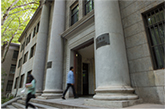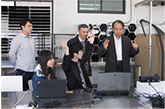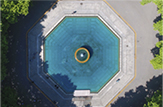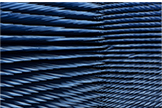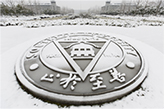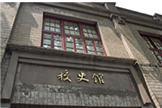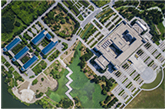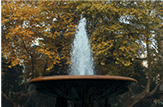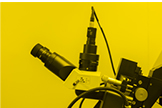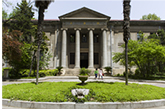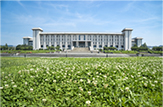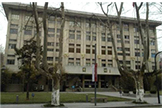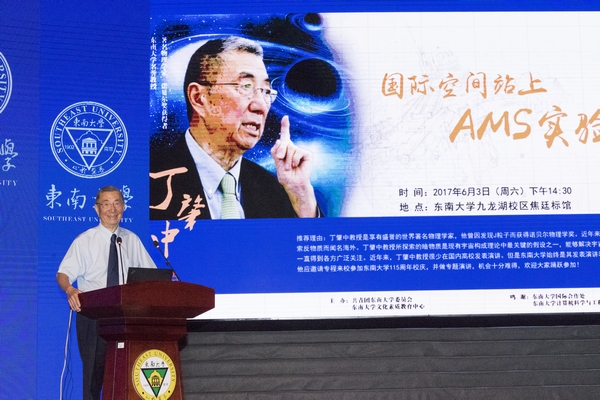

On June 3rd, Honorary Professor of SEU, the well-known physicist and Nobel Prize Winner Samuel Chao Chung Ting visited Southeast University. He brought his best wishes for the 115th birthday of Southeast University. He shared with the faculties and students the latest development of AMS program and discussed the future cooperation with SEU.
The speech was entitled “Latest Development of AMS”. The Alpha Magnetic Spectrometer (AMS) Collaboration announces the fifthanniversary of the AMS Experiment on the International Space Station (ISS) andsummarizes its major scientific results to date. The AMS Experiment (shown in Figure 1) is the most sensitive particle detector ever deployed in space and is exploring a new and exciting frontier in physics research. As a magnetic spectrometer, AMS is unique in physics research as it studies charged particles and nuclei in the cosmos before they are annihilated in the Earth’s atmosphere. The improvement in accuracy over previous measurements is made possible through its long duration time in space, large acceptance, built in redundant systems and its thorough calibration in the CERN test beam. These features enable AMS to analyze the data to an accuracy of ~1%. The first six years of data from AMS on the International Space Station are beginning to unlock the secrets of the cosmos. Since its installation on the ISS in May 2011, AMS has collected data from morethan 100 billion cosmic rays with up to multi-TeV energies and published its major physicsresults in Physical Review Letters (Appendix I).
The latest AMS measurements of the positron spectrum and positron fraction, theantiproton/proton ratio, the behavior of the fluxes of electrons, positrons, protons, heliumand other nuclei provide precise and unexpected information on the production, accelerationand propagation of cosmic rays. The accuracy and characteristics of the data,simultaneously from many different types of cosmic rays require the development of acomprehensive model. In the coming years, with more data, one of our main efforts is toascertain the origin of the Z = -2 events.Most importantly, AMS will continue to collect and analyze data for the lifetime ofthe Space Station. As the results to date have demonstrated, whenever a precisioninstrument such as AMS is used to explore the unknown, new and exciting discoveries can be expected.
In front of over 1,600 teachers and students in Jiaotingbiao Theater, Jiulonghu Campus, Ting thanked Southeast University sincerely for the efforts it had made in the AMS program.
At last, Ting shared with the students his own thinking about scientific research. He said that, “From my perspective, I treat physic researches as the most important thing in my life and anything should give way to physics, that’s because nobody could do everything well. I always know that my abilities are limited, so I have to concentrate on scientific researches.”


